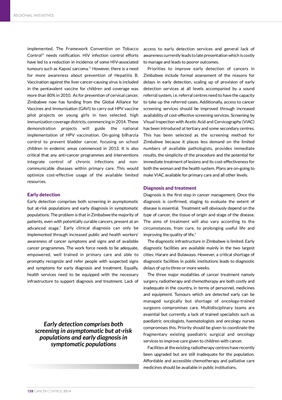
Priorities for cancer diagnosis and treatment in Zimbabwe
include the establishment of cancer multidisciplinary teams,
updating cancer treatment guidelines, the decentralization
of diagnostic and treatment services and making
accommodation available for patients being treated. Services
should focus on early detectable tumours. Training of primary
care staff to support decentralization should be
implemented.
Palliative care and rehabilitation
WHO defines palliative care as "an approach that improves
the quality of life of patients and their families facing the
problems associated with life-threatening illnesses, through
the prevention and relief of suffering by means of early
identification and impeccable assessment and treatment of
pain and other problems, physical, psychosocial and
spiritual".12
The provision of palliative care was pioneered in Zimbabwe
by Island Hospice in 1979 and initially mainly served patients
with cancer. Thereafter, service provision widened to include
patients with other chronic conditions such as AIDS in
response to the demand of the heightened epidemic. To
optimize coverage, more emphasis was put on communitybased services throughout the country.
The Hospice and
Palliative Care Association of Zimbabwe (HOSPAZ) was
established to support and promote palliative care services in
collaboration with the Ministry of Health and Child Welfare.
In 2004, through a pilot project which included five African
countries, WHO estimated the proportion of people needing
palliative care to be 1 in 60. Also noted was the low level of
integration of palliative care into the health care system.
Subsequent review by the African Palliative Care Association
(APCA) in 2010 showed Zimbabwean palliative care services
to have progressed. The following had been achieved:
‰ There was a critical mass of activists and a range of
providers and service types.
‰ Palliative Care was integrated into mainstream service
provision, research was being undertaken and a national
association had been formed.
‰ Palliative care provision is now part of the National
Health Strategy and standard palliative care guidelines
are already in use.
Palliative care priorities for the future include funding of
local programmes, ensuring availability of morphine at all
times and training primary health care workers and
community-based carers in palliative care. Underpinning all
of the above is finalization and approval of the guidelines by
the Ministry of Health and Child Welfare. The existing draft
palliative care policy which seeks to address pain
management, psychosocial and cultural needs of all people
living with cancer needs to be implemented. Rehabilitation
for cancer patients should also be prioritized.
Cancer surveillance and research
A cancer surveillance programme is an essential part of any
national cancer control programme. Evaluation of the current
situation, setting objectives for cancer control and defining
priorities, and later, monitoring the implementation of the
many individual cancer control activities is mandatory.
Zimbabwe has a population-based cancer registry mainly for
Harare. Funds permitting, a priority should be extension of
this to the provinces. To achieve this goal, skilled personnel
will need to be trained to implement expanded surveillance
services. Legislation to make cancer a notifiable disease will
go a long way to improving cancer registration. Ongoing
integration with other surveillance systems for noncommunicable diseases and HIV will improve
efficiency and
avoid duplication of processes. Statistical data to be
prioritized includes data on incidence, mortality, stage
distribution, HIV status, treatment patterns and survival.
These will provide a basis for studies into the important
causes of cancer in the local situation and for providing
information about the prevalence of exposure to these
factors in the population.2
Additionally, prioritizing investment into research and
increased collaboration between relevant stakeholders will
optimize research efforts.
Programme priorities for cancer control in
Zimbabwe
Sourcing and allocation of funds to finance these various
activities is the cornerstone of a successful programme and
there should be a dedicated national cancer control budget. A
comprehensive cancer prevention and control policy needs
to be developed. It is recommended that there be a separate
cancer-governing body with representation at provincial,
district and community level, to facilitate communication and
coordination and to streamline efforts towards the fight
against cancer. Similar structures led to success of HIV care.
Such a cancer control strategy should be implemented in
2014. The strategy should comprise comprehensive cancer
referral and management guidelines, together with
guidelines for decentralization and comprehensive cancer
control. The latter also need to be integrated with primary
health care for adults and children, school and work
programmes, care for patients with other non-communicable
diseases and HIV and AIDS programmes. Aligning the existing
REGIONAL INITIATIVES
CANCER CONTROL 2014 129